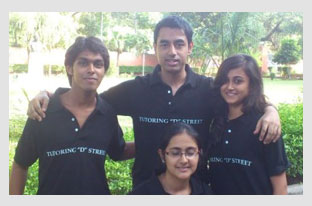Student Entrepreneurs at ISB

Abhinav Verma, centre, with colleagues from "Tutoring 'D' Street"
Continuing our series on student entrepreneurs, we now meet Abhinav Verma, whose venture, “Tutoring ‘D’ Street” provides training solutions to students and professionals in Microsoft Office products. Presenting Verma’s thoughts on entrepreneurship, its challenges and why a degree in management matters.
On multitasking: Managing coursework and business
I have split my responsibilities with my business partner, who is currently managing operations for Tutoring “D” Street in North India, making my life easier at ISB. In fact being at ISB has given me the opportunity to explore South India as a market for Microsoft Office training solutions in both the corporate and college space.
At ISB, it is really up to the students to manage their time and prioritise their tasks. I was determined to spend most of my time on expanding my business, refining my business plan, and obtaining above-average grades. Since I had clarity around these major goals, I opted to not get involved with many club-related activities at ISB. I made this conscious decision since balancing the academic workload with the demands of a full-time business can be very draining, both mentally and physically.
A management degree: Why does it matter?
Contrary to popular belief, a degree in management is very important for entrepreneurs, especially first generation entrepreneurs.
I studied and worked in the US for seven years before coming to ISB and hence was unfamiliar with the Indian business environment. As an entrepreneur, it was very important for me to understand the Indian business landscape, and build a meaningful network that I could rely on in the future. With its focus on practical and peer-to-peer learning, ISB fit perfectly into my goals. My purpose of joining ISB was to build my venture, and acquire skill-sets I could use going forward. In particular, I wanted to learn about how to penetrate challenging markets, negotiate with relevant stakeholders, create a team, accurately price my products, and build sustainability in the face of competitive markets.
While many successful entrepreneurs rely on intuition to conduct business, I believe many aspects of running a business involve theories, concepts and structures that need to be studied and applied to become successful. These can only be learnt in an MBA programme like the one here at ISB.
What every entrepreneur needs to know:
An entrepreneur needs to love his or her work, whether it is the industry, the product, or simply the lifestyle. While many entrepreneurs start businesses simply to make money, if they do not love what they do, they are very likely to quit when the going gets tough. As Steve Jobs once said regarding his firing from Apple at the age of 30, “It is only when you love what you do will you persist even in the face of adversity.” His passion for software and technology kept him going, and I believe this is something every entrepreneur must keep in mind to succeed.
On Success and Failure:
The great psychologist and Nobel laureate, Daniel Kahneman, once said, “The Mind is an excellent servant, but a terrible master,” implying that we are more likely to get discouraged than be motivated. To me, success is a state of the mind. The day you start thinking positive and believing in yourself, you will already have achieved success. Thus, success is not an end goal one should seek to achieve, but a way of life.
I believe failure is the inability to learn from mistakes. Making the same mistake once or twice is okay, but repeating the same mistake several times shows ignorance and foolishness.
Learning from ISB that will help my venture:
Although this sounds trivial, I have learnt the importance of market positioning at ISB. After taking courses such as Marketing Decision Making (taught by Professor S Sajeesh) and Competitive Strategy (taught by Professor Prashant Kale), I have learnt the downside of trying to do everything as an entrepreneur.
Companies that try to be “everything to everyone” end up being “stuck in the middle.” It is the companies that take a stand, and create an identity for themselves that ultimately prosper. Discussing real-life cases in class, such as the success story of Southwest Airlines, I realised that my strategy of providing both soft-skills and technical training to clients was wrong. I realised that I was trying to follow the typical Indian mentality of providing all training services to the client, at times at the expense of quality.
I am currently refining my business plan to chart out a strategy of playing to my strengths, and developing niche training solutions in Microsoft Office, which is what we originally started with. This will help us position our brand more clearly in the market, and also help us build appropriate resources and capabilities to support our strategy.
Equinox 2012: The Annual Alumni Learning and Networking Event
October 20-21, 2012
Mohali
Morningstar Investment Conference
November 1-2, 2012
Mumbai
ISB Digital Summit 2012
November 9-10, 2012
Hyderabad